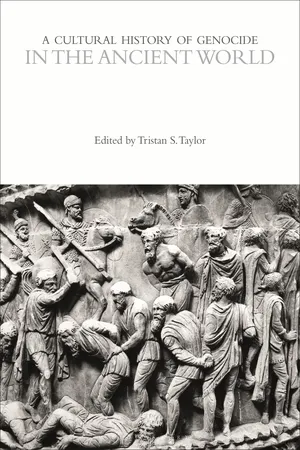
- 305 pages
- English
- PDF
- Available on iOS & Android
A Cultural History of Genocide in the Ancient World
About this book
The preamble to the United Nations Convention on the Prevention and Punishment of the Crime of Genocide recognizes "that at all periods of history genocide has inflicted great losses on humanity". Studies of the phenomenon of genocide have, however, tended to concentrate on the modern world. The original contributions in this volume turn the focus to the question of genocide and mass violence in the ancient world, with a particular emphasis on the worlds of Greece, Rome and the Near East. This volume presents a range of views on the challenges of applying the modern concept of "genocide" to an ancient context. It also considers the causes, motivations, and justifications of ancient mass violence, as well as contemporary responses to, and critiques of, such violence, along with how mass violence was represented and remembered in ancient literature and iconography. In addition, chapters analyse what drove the perpetrators of mass violence, and the processes of victimization, as well as the consequences of mass violence and ravaging warfare, including in particular mass enslavement and sexual violence.
Frequently asked questions
- Essential is ideal for learners and professionals who enjoy exploring a wide range of subjects. Access the Essential Library with 800,000+ trusted titles and best-sellers across business, personal growth, and the humanities. Includes unlimited reading time and Standard Read Aloud voice.
- Complete: Perfect for advanced learners and researchers needing full, unrestricted access. Unlock 1.4M+ books across hundreds of subjects, including academic and specialized titles. The Complete Plan also includes advanced features like Premium Read Aloud and Research Assistant.
Please note we cannot support devices running on iOS 13 and Android 7 or earlier. Learn more about using the app.
Information
Table of contents
- Cover
- Contents
- List of Illustrations
- General Editor’s Preface Paul R. Bartrop
- Acknowledgements
- Introduction Tristan S. Taylor
- 1 Causes Charlie Trimm
- 2 Motivations and Justifications David Konstan
- 3 Perpetrators Shawn Kelley
- 4 Victims Richard J. G. Evans
- 5 Responses David John Colwill
- 6 Consequences Kathy L. Gaca
- 7 Representations Clemens Koehn
- 8 Memory Sarah Lawrence
- Notes
- Bibliography
- Notes on Contributors
- Index